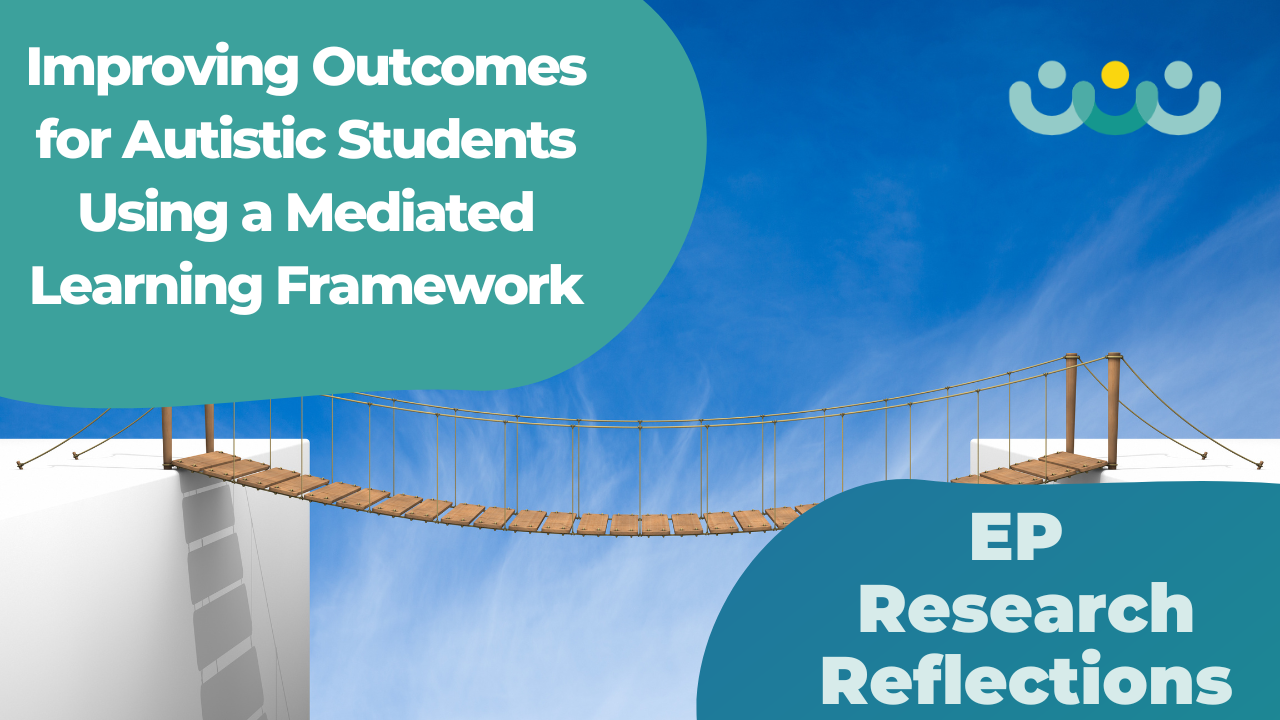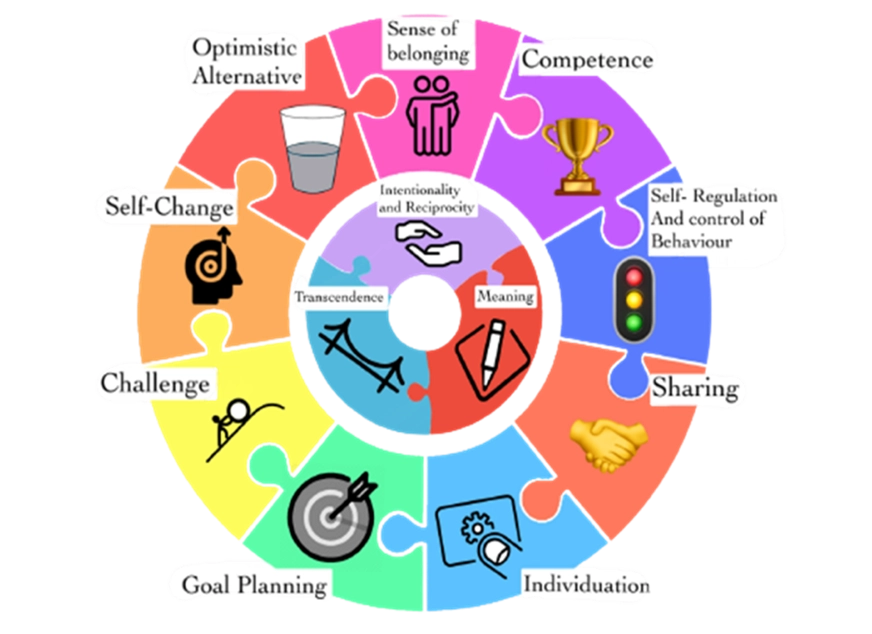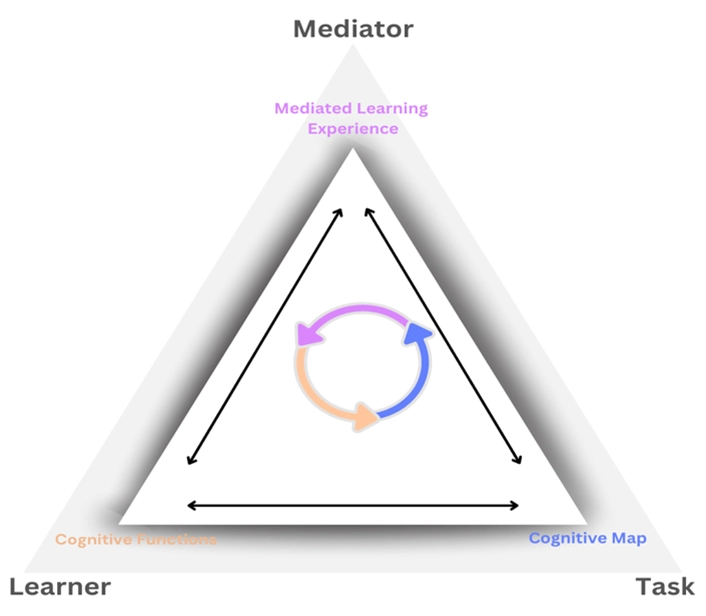Improving Outcomes for Autistic Students Using a Mediated Learning Framework
Nov 19, 2025
In this blog, Dr Helen Finnegan shares findings from her doctoral research, which examined how teachers’ use of mediated learning strategies in specialised autism classes can support better student outcomes. While my research is set within the context of the Irish education system, the challenges faced by Irish teachers reflect international trends and the need for teachers working with autistic students with additional needs accessing bespoke training to optimise learning outcomes.
Autism and Learning Outcomes:
Autism presents as a complex, multi-faceted condition and no one theory, to date, has fully captured the breadth of its core characteristics. Despite the increased awareness and provision of specialist support for autistic learners in schools, learning outcomes for students are poor. The heterogeneous presentation of autism makes it challenging for teachers to develop education plans to meet individual needs and the professional demands of working in a specialised autism class setting can be a contributor to teacher burn out and low self-efficacy, factors which have also been shown to impact indirectly on student outcomes (Lauermann & ten Hagen, 2021).
What is Mediated Learning?
The mediated learning approach which is a core aspect of the dynamic assessment methodology is a framework of twelve key interaction skills that can be used flexibly in all learning activities to enhance outcomes (see Table A below). The framework is based on Vygotsky’s Zone of Proximal Development (Vygotsky, 1987) and Feuerstein’s Theory of Mediated Learning Experience (Feuerstein et al., 1991) which emphasise the collaborative nature of learning, in which the mediator, typically a parent or teacher, facilitates the acquisition and mastery of new skills that result in effective and meaningful experiences for the learner. While mediated learning benefits all learners, one of the strengths of using this approach with autistic learners is its ability to ameliorate the impact of non-intellective factors such as impulsivity, blocking, motivation, persistence and executive functioning difficulties that can play a significant role in reducing student engagement in learning tasks. In the training programme which I developed, teachers were introduced to the mediated learning framework and shown how they could use it in their student interactions to improve engagement and enhance current learning while developing important skills they can apply to future learning. Teachers were also shown how they can use knowledge of their student’s cognitive functions/abilities and task analysis to understand their students’ learning styles and thus identify the specific barriers that hinder progress.
Figure A: The mediated learning framework

As can be seen in the diagram below, in a mediated learning interaction, the mediator/teacher takes an active role by evaluating the tasks or skills the learner needs to complete. They observe the learner’s initial response and strategically position themselves between the learner and the task, using various strategies to enhance the learner’s experience and mastery. This can involve strategies such as focusing the learner’s attention on the task, breaking it down into its component parts, highlighting the relevant aspects of the task and making important links between it and other areas of learning.

My research consisted of three training sessions that were delivered online to sixty-seven teachers working in specialised autism classes in primary and post-primary schools in Ireland. The study, which employed a mixed-methods research design, focused on teacher self-efficacy with results indicating a statistically significant increase in teacher self-efficacy following completion of the training. The mediated learning skill of intentionality & reciprocity (engagement) was shown to have a positive impact on teacher self-efficacy, providing evidence for the benefits of teachers integrating the mediated learning methodology into their daily interactions with students. Qualitative information provided by teachers from semi-structured interviews and training evaluation questionnaires cited the benefits of using the mediated learning framework in their classrooms to better understand their students’ unique learning profiles as well as enhance the quality of their interactions which impacted positively on their learning experiences.
Rationale for this training:
As an educational psychologist supporting autistic students, I observed the need for teachers in special autism classes to receive training in mediated learning methodology to improve student outcomes, based on the following research findings:
Poor and inconsistent outcomes for autistic learners - The need for teachers to use a broader framework that focuses on the process of learning using a person-centred approach to identify strengths, obstacles, and strategies for effective learning with optimal support (Haywood & Lidz, 2006).
Teacher burnout - The need for ongoing training opportunities that bolster teacher self-efficacy (TSE), which has been identified as a protective factor against burnout for teachers working with autistic students (Jennett et al., 2003).
Emphasise the teacher/student relationship as key for learning - At the heart of the mediated learning approach is the relationship between the teacher/mediator and the student and teachers. Using the mediated learning framework can provide teachers with a template to improve student engagement and thus learning outcomes.
A flexible methodology - The mediated learning methodology adapts to autistic learners’ diverse needs. Through the process of guiding and scaffolding skill acquisition enhances meaningful learning, improves outcomes, boosting learning outcomes and teacher confidence.
A novel teaching methodology for autistic students - While the mediated learning methodology has been used in clinical settings by speech and language therapists and psychologists when working with children with complex needs and has been incorporated into several programmes that have been delivered to learners of different ages across different settings, it has not been developed into a bespoke training programme for teachers working with autistic students with complex needs.
Mediated Learning Training Sessions:
Session 1 introduced participants to dynamic assessment, focusing on Feuerstein’s theory of mediated learning experience (MLE) and its three core principles: intentionality and reciprocity, meaning, and transcendence. Teachers were introduced to video technology as a tool for developing and practising new skills and used this methodology to practise these skills with a student in their class in between the sessions.
Session 2 began with small-group reflections on the teachers’ use of the three mediated learning skills, guided by their reflective logs. The remaining nine mediated learning skills were then introduced and explored through video examples and discussion. The teachers practised the skills with the same student which they recorded for reflection/analysis afterwards.
Session 3 focused on applying Feuerstein’s mediated learning framework to develop intervention plans for students with complex needs. Teachers were introduced to Feuerstein’s three phases of thinking; input, elaboration, and output as well as task analysis as an effective method to identify the specific areas of thinking that were challenging for a learner.
Qualitative Feedback:
Five semi-structured interviews were conducted with teachers to elicit their opinions of the mediated learning workshops and suggestions to refine the training.
The following key themes were identified and have been used to guide refinements to the training:
Theme 1: Building Teacher Confidence
All five interviewees valued the practical experience for building confidence and compete
Theme 2: Challenges for Teachers.
Students’ diverse and evolving needs make developing effective education plans challenging.
Theme 3: Opinions of Mediated Learning Training.
The framework was described as empowering, allowing teachers to take ownership of their students’ learning by selecting relevant content and skills to foster meaningful engagement
Theme 4: Key Components for Effective Autism-Specific Training
The teachers offered suggestions to improve the training, including in-person sessions with ongoing support from their school psychologist, the provision of whole-school training to embed the practice across the school community, a training manual and video recordings as exemplars of good practice.
Future Development of the Training:
The findings from my doctoral research provide statistical evidence for the benefits of teachers using this framework to enhance the learning of autistic students. Using the mediated learning framework puts the teacher and their professional expertise at the heart of learning, that not only results in effective learning experiences for their students, but creates positive, rewarding teaching experiences for them. Further refinements to the programme based on feedback from the teachers will be central to the ongoing development of this training.
References
Feuerstein, R., Klein, P. S., & Tannenbaum, A. J. (1991). Mediated learning experience (MLE): Theoretical, psychosocial and learning implications. Freund Publishing House Ltd.
Haywood, H. C., & Lidz, C. S. (2006). Dynamic assessment in practice: Clinical and educational applications. Cambridge University Press. http://ebooks.cambridge.org/ref/id/CBO9780511607516
Jennett, H. K., Harris, S. L., & Mesibov, G. B. (2003). Commitment to philosophy, teacher efficacy, and burnout among teachers of children with autism. Journal of Autism and Developmental Disorders, 33, 583-593.
Lauermann, F., & ten Hagen, I. (2021). Do teachers’ perceived teaching competence and self-efficacy affect students’ academic outcomes? A closer look at student-reported classroom processes and outcomes. Educational Psychologist, 56(4), 265-282.
Vygotsky, L. S. (1987). The collected works of LS Vygotsky: Problems of the theory and history of psychology (Vol. 3). Springer Science & Business Media.
Stay connected with news and updates!
Sign up to receive updates, resources, inspiring blogs and early access to our courses.
Don't worry, your information will not be shared.

